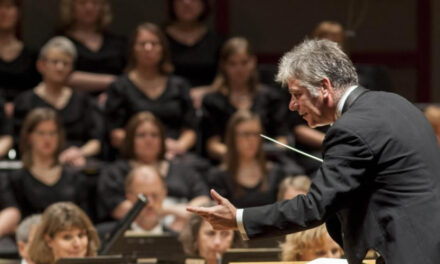The second of two spring concerts presented by the Raleigh Civic Symphony Association was given in the Ballroom of NCSU’s University Student Center on the afternoon of April 25. Like the previous week’s program, this one focused on “Voices of Asia and the Pacific,” and because the two afternoons complemented and reinforced each other in many ways those who managed to attend both programs were richly rewarded. For the second concert, played by the Raleigh Civic Chamber Orchestra, Music Director Randolph Foy selected smaller scores by several composers whose music had been introduced by the full RCSO. It was revealing in many ways to experience second works by two great 20th century masters whose music ranks among the finest examples of “crossover” music, particularly since that adjective has taken on such negative overtones of late; in the cases of Colin McPhee and Lou Harrison, there are no negatives – McPhee’s Nocturne, a late work, composed in 1958, may be seen as part of the continuum that shaped his musical life after he “discovered” gamelan orchestras, and Lou Harrison’s remarkable Suite (for violin, piano, and small orchestra), composed in 1951 in Black Mountain, is a rock-solid score that earned the attention of none other than Leopold Stokowski. The two scores dominated the first half of the April 25 concert, which began with an excerpt from John Cage’s celebrated 4’33” – the piece presented, subtitled “1’13”, set a reflective and contemplative mood for the rest of the program, although cynics might have lamented that the more festive finale of the score had been offered, in lieu of the one that was “played.” There was brightness and festivity aplenty during an interlude between the McPhee and the Harrison, provided by members of UNC’s Gamelan Nyai Saraswati, whose director, Sarah Weiss, made brief introductory remarks before she and her artists – Syam Gradde, Michelle Cronquist, Cassidy R. Pratt, Tim Stallman, Ethan Lechner, and Scott O’Day – performed three traditional pieces for Javanese gamelan. That McPhee’s influences were of Balinese origin, and that the music from Bali is not exactly the same, was a minor point, given that Harrison’s homemade (and hand-crafted) instruments, which were among the first heard in America, were modeled on a collection like Chapel Hill’s.
What was amazing about McPhee’s Nocturne, particularly in the wake of the previous week’s “Tabuh-Tabuhan” and the other music heard at both concerts, was the skill with which the composer captured the essence of the forms and sounds by using thoroughly Western instruments. Harrison managed to do the same thing, brilliantly merging East and West with a small ensemble. The players included Concertmaster Lin-Ti Wang and pianist Kentaro Shimizu, cellists David Oh and Michael Bridgers, bassist Josh Hines, flutist Mary Mitchell, oboist Paul Baerman, harpist Emily Laurance, percussionist Elena Albrecht, and Frank Pittman, who played celeste and a “tack” piano (with thumb tacks added to the hammers). For the record, Stoki’s version of the Harrison and recordings of McPhee’s Nocturne, Henry Cowell’s “Homage to Iran,” and several other milestone works were published by CRI (CRI CD 836), and second-hand copies often turn up on auction lists.
Part two of the concert offered less “mainstream” and much more challenging fare that projected some similar effects. “Pieces for Prepared Piano and Strings” (1957) by Toshiro Mayuzumi took Cage’s innovative tinkering with the innards of keyboards a step farther than the American might have envisioned – the net result is a keyboard that often sounds like a one-person percussion ensemble, thanks to the addition (in this case) of various screws and erasers to the piano’s strings. There was no direct kinship to Indonesia, but the sounds were surprisingly similar.
At the first of these concerts, Jennifer Chang dazzled the audience with a traditional solo for GuZheng. At the RCCO program, she performed ZhanHao He’s “The Lamentation of a Hero: General Yue Fei,” a bit of (presumably) 20th century program music that relates an ancient (12th century) tale. The Chinese lute was remarkable to hear; less impressive was the sort of Hollywoodized accompaniment, which was a bit like warmed-over Korngold without brasses. That said, the use of folk melodies (or perhaps folk-like melodies) gave the substantial piece a degree of charm, and Chang’s impressive playing – ably supported by the RCCO’s strings – produced the afternoon’s biggest single ovation.
The grand finale was Bright Sheng’s Postcards, a suite (of sorts) of four impressions of China, composed in 1997. Some of these were decidedly knotty offerings, and the fact that they came at the end of a very long program probably did them a bit of a disservice. The finale of Sheng’s China Dreams (1992-5), played on April 18, had been, in retrospect, that program’s most challenging offering, and this was again the case with Postcards . A second (or third) hearing would probably help, and there may be hope for that, since at the outset Foy had noted that these programs merely scratch the surface – that there’s great music, largely unknown here, from all over Asia – from Thailand, from Vietnam, from Korea – that may be on our musical horizon in future concerts.











